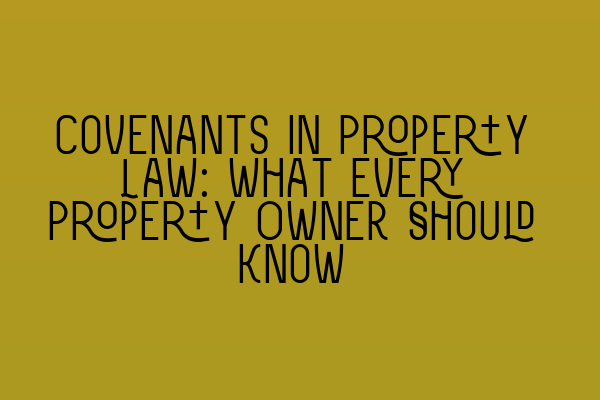Covenants in Property Law: What Every Property Owner Should Know
As a property owner, it’s crucial to have a solid understanding of the various legal aspects that govern your property. One key concept that you need to be familiar with is covenants. Covenants play a significant role in property law and can have a lasting impact on your property rights. In this blog post, we will delve into the world of covenants, explaining what they are, how they work, and why they are important. So, let’s get started!
What are Covenants?
In property law, a covenant is a promise or agreement made between two or more parties regarding the use or restrictions of a property. These agreements are usually written into the property’s deed and are legally binding. Covenants can dictate a wide range of actions or behaviors, such as the use of the property, maintenance obligations, or architectural guidelines. They can apply to both residential and commercial properties.
Types of Covenants
There are two main types of covenants: affirmative covenants and negative covenants. Affirmative covenants require the property owner to take specific actions or fulfill certain obligations. For example, a residential neighborhood may have an affirmative covenant that requires homeowners to pay regular dues towards the upkeep of common areas.
On the other hand, negative covenants impose restrictions on property owners, prohibiting them from engaging in certain activities or behaviors. For instance, a commercial zoning covenant may prevent property owners from operating certain types of businesses on their premises. Negative covenants are often used to maintain the character and value of a neighborhood or development.
Enforcement of Covenants
Covenants are legally enforceable, and failure to comply with the terms specified in the covenant can result in legal consequences. In most cases, the enforcement of covenants is carried out by the property owner or a homeowners’ association that oversees the neighborhood. If a property owner violates a covenant, they may face lawsuits, fines, or even injunctions that prohibit them from engaging in the prohibited activity.
Covenants and Property Value
Covenants can have a significant impact on property value. In many cases, covenants are created to maintain and enhance the desirability of a neighborhood or development. For example, a covenant that prohibits the construction of structures that obstruct scenic views can help preserve property values in an area. Furthermore, well-enforced covenants can provide reassurance to potential buyers, knowing that the neighborhood is well-maintained and protected from undesirable changes.
Understanding and Interpreting Covenants
It is important for property owners to carefully read and understand the covenants associated with their property. If you are unsure about the terms or implications of a covenant, it is recommended to seek legal advice. A property law solicitor can review the covenants, explain their impact on your property rights, and help you navigate any disputes or issues that may arise.
Conclusion
Covenants are a crucial aspect of property law and play a significant role in determining the rights and responsibilities of property owners. Whether you are purchasing a new property or have been a property owner for many years, understanding the covenants associated with your property is essential. By fully comprehending the covenants, you can make informed decisions about your property and protect your rights as a property owner.
Related Articles:
– SQE 1 Practice Exam Questions
– SQE 1 Practice Mocks FLK1 FLK2
– SQE 2 Preparation Courses
– SQE 1 Preparation Courses
– SRA SQE Exam Dates
If you have any questions or need assistance with property law matters, don’t hesitate to reach out to SQE Property Law & Land Law. Our team of experienced solicitors is here to help you navigate the complexities of property law and protect your rights as a property owner. Contact us today for a consultation.
